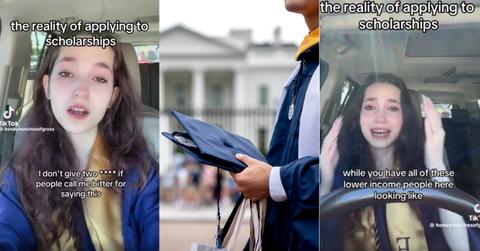“Only Rich Kids Get Scholarships” — Student Slams Colleges for Ignoring Children of Poor Parents
"Unpaid internships are the same bulls---"
Jun. 3 2024, Published 12:17 p.m. ET

A frustrated college student's invective against the injustice of scholarship applications has gone viral on Reddit.
"The reality of applying to scholarships," a text overlay in the video of a now-deleted TikToker named Adri's (@honeybunchesofgross) account reads. She records the video from the interior of her car where she shouts into the camera lens.
In the clip, she's wearing what appears to be a graduation gown. She sets her phone down and begins to vent her frustrations with the college scholarship application process where she says that only "rich kids" are the ones who are getting help with funding for their university education.
"I don't give two s---s if people call me bitter for saying this but let's talk about the fact that as a 2023–2024 graduate" — her voice breaks at this point in the video; she gesticulates with her hands, crying — "why I have applied to thousands of f------ scholarships but the only people who are getting the scholarships are the f------ rich people!"
Her voice cracks at the last part, highlighting the injustice she has experienced in spite of putting her hat in the ring for no fewer than 2,000 different potential scholarships — "The f------ rich people!" she shrieks before continuing, "like your parents have money, your parents are doctors, they're f------ lawyers, they're f------ judges!"
She continued to highlight just how unfair it was that young folks whose parents are working financially secure and relatively high-paying jobs are managing to secure scholarships for themselves at universities: "And you got millions of f------ dollars to go to college while you have all of these lower-income people here looking at us like, what the f---?"

She punctuates her tirade with another scream before the video ultimately ends.
While some people may have found Adri's expression of her anger off-putting, it appears that there are statistics to back up her claims that the children of folks who come from higher-income families do disproportionately benefit from non-federal aid university funding.
Nerd Wallet penned a 2020 article on this very phenomenon, and it appears to be based in a strategy colleges are adopting in order to draw in "affluent students"; as a result, "it's leaving those who need aid the most with fewer resources to afford college."
The outlet wrote: "Students in the highest 25 percent income range received a greater amount of non-federal financial aid ($11,300) on average compared with all other income levels, including those in the lowest 25 percent income range ($7,500), according to a 2019 report on non-federal aid by the National Center for Education Statistics."

From a university advancement perspective — this makes sense. Establishing relationships with rich families means that there's a higher chance of the families of these students donating money to the university. So getting a rich kind into their college with the lure of a scholarship could be a down payment for building a relationship with higher echelons of society.
However, this also means that hardworking and even accomplished students can be left in the dust. Just from my own anecdotal experience — my sister, who is a doctor, was published in numerous medical journals, graduated from Columbia University with a degree in epidemiology, and secured full-time employment as an analyst for Pfizer before getting accepted into medical school.
Her real-world accolades however, didn't seem to amount for much at Rowan University despite the fact that we didn't come from an affluent family — her requests for a scholarship and financial assistant were denied and she had to take out private loans. When she asked if she could delay her enrollment in med school after being accepted for a year so she could save money at her high paying Pfizer job, she was initially told she could.

However, just weeks out before the semester, a rep from the school reneged on this offer and told her that if she wanted to attend med school, then she would have to enroll that very year. She uprooted her life in Manhattan to go to school in South Jersey as she always dreamed of becoming a doctor.
And despite representing the university at different conferences, she couldn't help but notice that students who arrived on campus in luxury cars, while she walked to school, received scholarships — and, like Adri's gripes, my sister would also discuss how their parents were also either doctors, or lawyers who specialized in international law.

One Redditor who responded to the post suggested that this discrepancy doesn't exist solely because colleges are attempting to lure in the children of rich parents because schools want to create a more "exclusive" atmosphere, but rather because higher-income families can foster environments that allow students to excel.
"I remember reading somewhere that a huge part of the disparity in scholarship funds comes from the fact that low income families tend to have parents with lower educational attainment relative to wealthier families, who often have parents that are more familiar with the application process and have a greater ability to help their children with applying."
They continued: "On top of that, many scholarships require extracurriculars that have a large intersection with class — it's difficult for someone in a low income household to have sports and volunteer work under their belt when they have to work a job after school to help make ends meet. I certainly didn't have any extracurriculars after high school for that exact reason."